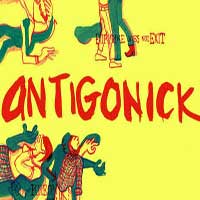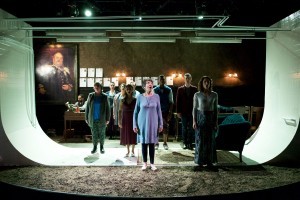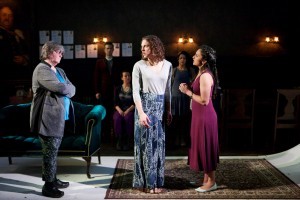
 Highly Recommended **** For two millennia, observers have wondered if Sophocles’ Antigone is the tragedy of Creon or its eponymous heroine. Ann James has answered the question in one night. In the first half of The Sideshow Theatre Company’s production of Anne Carson’s (very) free translation of Sophocles’ “Antigonick,” Ms. James plays Kreon, the successor to the ill-fated Oedipus, but director Jonathan L. Green has made the decision to run the play through twice, and in the second half, she plays Antigonick: Oedipus’ daughter who is determined to bury her slain brother in violation of King Kreon’s decree that holds he was a traitor to Thebes.
Highly Recommended **** For two millennia, observers have wondered if Sophocles’ Antigone is the tragedy of Creon or its eponymous heroine. Ann James has answered the question in one night. In the first half of The Sideshow Theatre Company’s production of Anne Carson’s (very) free translation of Sophocles’ “Antigonick,” Ms. James plays Kreon, the successor to the ill-fated Oedipus, but director Jonathan L. Green has made the decision to run the play through twice, and in the second half, she plays Antigonick: Oedipus’ daughter who is determined to bury her slain brother in violation of King Kreon’s decree that holds he was a traitor to Thebes.
Ms. James dominates the production in both roles. In the first half, she reads what really is a mix of Sophocles and Carson’s dialogue is in an unflinching classical style, even in passages that border on street slang. Nonetheless, it never sounds ridiculous, just powerful. Nor is the strength of Ms. James performance limited to the way in which she reads the dialogue. She exudes the determination, grit, ruthless energy, and most of all cold charisma, as Kreon, that allow tyrants to stay in power and often to be popular, at least with their contemporaries. With Ann James as Kreon, it is his insistence that law, order, and obedience to king and country take precedence over family, duty, personal morality, conscience, and religious obligation lead to his own son’s death in a terrible contrapasso that makes the tragedy squarely Kreon’s. Obviously, the exact same thing happens the second time through, but the focus is different. When Ms. James plays Antigonick, the play is center on its heroine who Ms. James plays as the complete inversion of her Kreon: vulnerable and frightened, but determined to do right by the Gods and her brother even though she knows it will lead to certain death (which it does).
While in the first half of the play, Ms. James is well matched by Anu Bhatt’s fierce and passionate Antigonick and the Lona Livingston somber, fatalistic, and sage performance as the choragus, the supporting cast in the second is not quite as impressive. David Prete seemed a little bored as Kreon which may have been a conscience choice but it wasn’t affecting, and Ms. Bhatt was never really able to shed her passion to become the detached Choragus that helped make the first half of the play work so well. Anne Carson is a poet, and she plays with language, pointing out when characters are inclined to excessive nouns and verbs in her translation, and continually makes puns on the word and name Nick. It can see it even in the idiosyncratic way she has chosen to translate the title from classical Greek alphabet. At one point, someone asks “what is a nick of time?” The question is being answered throughout the play by a metronome ticking in the background of an eloquent but somber set (Yu Shibagaki) that looks much like a modern funeral parlor.
There were a couple of technical problems in the play. The large and elaborate set in conjunction with the a smaller stage sometimes got in the way of the blocking could at times be clunky, and there was considerable dis unity in costume styles. The production may have been even more successful if each actor had been wearing formal garb (many were) to match the ambience of the set. Nonetheless, the production brought something very fresh, even new, to a 2,000 year old story and that is saying something
Anne Carson’s free translation of Sophocles’ Antigonick is being produced by Sideshow Theatre Company at Victory Gardens Richard Christiansen Theatre located at 2433 N. Lincoln Avenue in Chicago through April 5, 2005. Performances are Thursday through Saturday at 7:30 pm and Sundays at 3:00 pm. Tickets can be purchased at www.victorygardens.org by calling 773-871-3000 or at Victory Gardens box office located at 773-871-3000. Tickets are between 20 and 30 dollars.
To see what others are saying, visit www.theatreinchicago.com, go to Review round-up and click at “Antigonick”
c






More Stories
“Titus Andronicus”
“Joseph and the Amazing Technicolor Dreamcoat”
“The Book Of Mormon” ( Milwaukee) reviewed by Amy Menzel